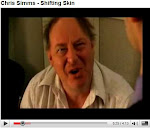So? – what have you changed for the New Year?
(Doing some more writing for a start! – specially for Lynne)
(Doing some more writing for a start! – specially for Lynne)
"Hello!? Anybody about?"
Mike stepped inside the apartment, and listened. He could have sworn he’d heard a faint noise, muffled, distant, but now it appeared to have stopped. "That fridge’s getting noisy. I suppose we’ll need a new one soon."
He immediately started hunting for the remote for the TV. As usual, like all remote controls, it had attempted to secrete itself under a cushion. He was wise to its ways, however, retrieved it, aimed the priceless gadget at the set and pressed ‘On.’
He was waiting patiently for signs of life when the hallway door opened. "Good grief! Spencie! I didn’t know were home. Why didn’t you answer when I called out?"
"Called out?" Spencie looked startled, and her eyes darted round the room. "I didn’t… didn’t hear you."
"How come you’re not at the office?"
"Took the afternoon off. Things to do. Anyway, how come you’re home so early?"
"The international’s on live. England against Belarus. The kick-off’s four o’clock, so I thought I’d sneak out of work and catch it. I didn’t expect you’d be in for dinner till it was nearly over. Are you alright?"
"Of course. Why wouldn’t I be?"
"You seem a bit feverish."
"Do I?" She put a hand to her cheek, her fingers fidgeting upwards to cover her eyes. "I’ve just been doing a spot of gardening. Potting some flowers. In the bedroom. Why don’t you come and see?"
"That’s alright," Mike laughed, in the way that she had once found so appealing. "I wondered if you had a secret lover in there!" He moved closer to her and put his forehead against hers. "Hey, toots," he said, mock-Bogart, "I thought I was all the man you could handle."
She seemed to relax into his arms. "Why don’t you come into the bedroom anyway, and let me…" she brushed his cheek with her mouth, "… check?"
"Well, swee’heart… – what is wrong with this damn remote?" He suddenly snapped his attention to the still-silent television. "The game will have started! I think we’re going to have to get a new TV. And a new fridge too. I’m sure I could hear the thing buzzing when I came in."
She stared at him coldly. "The batteries have probably gone."
"Again?" he said, exasperated. "They’re always packing up. I can’t change channels on this stupid TV without the zapper." He snapped the cover off the back of the control and again he looked puzzled. "The batteries really have gone! There aren’t even any in here."
Spencie licked her lip and took his hand. "Maybe you don’t need to watch football after all."
Mike looked back at her, adoringly. "Spencie. Darling… It’s a qualifier – I’ve got to watch it. Have we any spare batteries?"
She pivoted on her heel and stamped off up the hallway to the bedroom. She returned, jackboot, and threw a pair of Energizer Extra Power at him. "I shall get a bunch of spares tomorrow," she announced, as if making a manifesto commitment, then retreated back to the bedroom, closing the door sharply.
It wasn’t until half time, with the score still nil-nil, that he wondered what she was doing in there.
There was an atmosphere in the apartment after that. Christmas was coming. To Spencie, this meant: presents, wrapping paper and decorations. To Mike, it meant a crowded fixture list in the Premier League. Negotiations were entered into, and a rapprochement was achieved – Mike would go shopping anywhere Spencie wished as long as this didn’t coincide with Manchester United playing at home. He would not attend away matches as long as highlights were shown.
It came to the Saturday before Christmas. Both had had a good day – a pile of purchases lay on the throw-rug before the couch, and Mike was secretly relieved to have an excuse not to travel to all the way to Fratton Park.
And so they ended up on the couch, Match of the Day seemingly sinking into the background as the two of them demolished a bottle of Pinot grigio. Even the highlights had lost relevance as Mike had already accidentally seen the results in a branch of Currys.
"I was wondering," said Spencie in her curiously circuitous way, "whether we might be thinking of an early night."
Mike looked at her and seemed on the edge of a decision. "And Carrick keeps feeding Ronaldo down the channels," the commentator was saying, "but the Portsmouth defence is holding firm."
"Well, change it," Mike yelled at the TV, "cross to the other wing!"
Mike wondered later at what point in the evening Spencie had gone to bed.
It was already dark on New Year’s Eve when Mike let himself into the apartment, with his now customary sheepishness. Spencie had become so volatile these days, so unpredictable, he had to be ready for anything. And, on this occasion, he felt pretty sure that he was.
Spencie confronted him in the lounge. "I was wondering when – or if – you’d turn up. Thought perhaps you had gone to see your precious United."
"Don’t be daft, pet – they don’t play on New Year’s Eve."
"I sometimes think you love Man United more than you love me."
Under his breath, he muttered, "I sometimes think I love Man City more than I love you."
"What!?" she bellowed.
"I said Man United aren’t as pretty as you."
"How can I be compared with a football team on the basis of who’s prettier!?
"Come on, Aspen," – he knew she hated it when he used her formal name – "change the record: ‘you’d rather watch a game than make love.’ When have I ever said that?"
Spencie seemed to coil like a serpent and hissed, "Do you know what is the one time each year we don’t make love?"
"When your mother visits?"
"No," she retorted, triumphant, "when it’s the football season. Well, not any more!" She strode out of the room and returned a moment later with a stranger, another woman, rather plain and shapeless in Mike’s view, with a blunt bob haircut. "Meet Geraldine – my new lesbian lover! So whatever plans you had for this New Year, I think you might have to change them!"
Spencie had imagined her announcement would have the lurid impact of a bomb in a paint factory. But it somehow landed curiously flat.
"I’m not so sure about that," he said, and fetched a male stranger from the entrance. "Meet Gerald, my new best mate. I just came back to tell you – we’re going down Canal Street for the evening to discuss a flat back four and two holding players over a few glasses of Bailey’s."
The End
Author’s note: several people were kind enough to offer constructive criticism of this piece and, particularly, whether the use of the word ‘Lesbian’ was necessary near the end. I myself agonised over this as I am all in favour of letting the reader draw his or her own conclusions and at no other point is gender orientation mentioned explicitly (why should it be?) I came very close to removing the word, but changed my mind, for the following reasons. Firstly, she is not just adopting a new partner, but making (apparently) a major life-style choice - the main interpretation of the piece's title, Changing Channels - as a consequence of her recent relationship. Secondly, she wants to emphasise this point specifically to annoy and prick the conscience of her former partner. Finally, and more trivially, she is probably lying! – she has in all likelihood, neither got a new partner nor adopted a new lifestyle – her outburst is motivated as an attack on her old partner. His response, however, is somewhat different…
.jpg)





